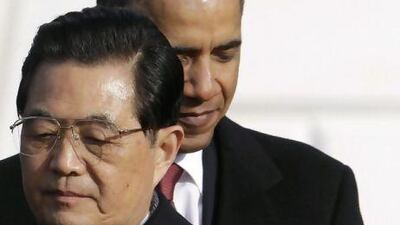Somebody usually gives me a great tome of a book for Christmas, and it regularly ends up as a coffee table ornament for a few months, then a doorstop, before it is retired to that section of the bookshelf marked: "Never to be read, but looks impressive."
I thought it was deja vu all over again a few weeks back when I unwrapped a 750-page hardback monster called Why the West Rules - For Now by a Stanford University professor called Ian Morris. I'll never get through that, I thought. But look how wrong you can be.
This week, with Hu Jintao, the Chinese president, visiting the US and every "expert" giving an opinion on the new rivalry between the two "superpowers", I've been watching smugly.
Because, thanks to Prof Morris, I know how the story ends: the Chinese, or rather eastern society in general, wins, the West loses, and everywhere else in between, such as the Middle East, is a winner or loser according to its proximity to the eastern and western "cores".
And I also know when it will happen. Prof Morris says that by the year 2103, eastern society, judged on a number of social, economic and cultural indicators, will overtake the West.
My first reaction on reading that date was one of relief. Most analysts say China will become the world's largest economy by 2030, and this week all sorts of military types have been wheeled out to warn of imminent Chinese aggression, in just the next decade or two.
But according to Prof Morris, westerners actually have a bit longer in charge and calling the shots in world economics and politics.
I haven't actually finished the book yet. I'm just at that interesting period of history where the Black Death (bubonic plague) has reduced the population of the world by between a third and a half, but affected the West more than the East, because of demography and social development.
When this horrible disease hit in the mid-14th century, the East had been in the ascendancy for nearly a millennium. While westerners were foolishly playing knights and maidens, and running off to the Crusades (which Prof Morris says probably raised global living standards via the exchange of technology between East and West), the Chinese were living in million-strong cities, using coal as their industrial fuel and building ships that could sail (maybe) to the Americas.
They had paper currency, gunpowder and a whole array of sophisticated agricultural techniques that made the West look primitive. And they had silk, which they sold to the West as its first luxury must-have, and in the process opened up the silk routes, accelerated the prosperity of the Chinese and enabled them to overcome the effects of the Black Death much faster than the West.
Prof Morris is full of fascinating little asides. The Mongols, under Ghengis Khan and his successors, were a force for good, too, after their initial orgy of rape and pillage. They believed, surprisingly, in religious diversity, and arranged a modus vivendi between the Christian West, (largely) Buddhist East and Muslim centre that further stimulated global commerce.
Centuries before Goldman Sachs or Google, the Mongols were the first proponents of globalisation.
One Mongol khan organised a grand debate between wise men from the three faiths, to prove in open discourse which was best. In the Mongol way, they served potent fermented yak's milk to the speakers, who soon lost the thread of their sophisticated arguments. The Christians began singing hymns, the Muslims reciting the Koran, while the Buddhists began to meditate. After more yak's milk, the Christians and Muslims joined the Buddhists in silent contemplation.
But like them, I have digressed. The point is that, according to Prof Morris, the inevitable triumph of the East in 2103 has little to do with the global financial crisis, US indebtedness, China's huge human and mineral resources or its exporting power, or even its growing military capability.
It is already written in the pattern of global history that the East will overtake the West then, and we westerners will not be able to do anything about it.
It is all to do with what Prof Morris calls "energy capture". He argues that development has been determined throughout history by the efficiency with which humans, from ape-men to homo sapiens, have been able to convert natural energy into methods for raising their own standards of living.
Fire, agriculture, fossil fuels have determined human progress in the past, and now nuclear and alternative energy forms will decide the future. The Chinese realise this, which is why they are buying up the world's resources faster than anybody else.
Just this week, amid a lot of the sinophobia sparked by Mr Hu's visit to Washington, one vastly significant fact emerged: in 2010, China spent more on projects, deals and acquisitions in the developing world than the World Bank. By US$110 billion (Dh404bn) to $103bn, China outspent the professional world developers.
So if eastern triumph in the development race is inevitable, what role should the Middle East play? Maybe the region should emulate the Mongols and try to bring harmony and understanding to the competitors.
Probably a good idea to take the fermented yak's milk off the menu though.
